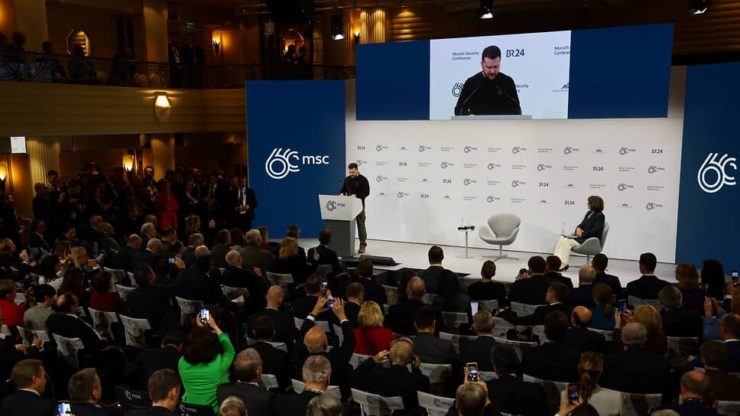
Germany recently hosted the 60th International Conference on Security and the World Situation. This largest international forum brought together more than 40 heads of state and government, some 90 ministers, mainly of defence and foreign affairs, prominent political scientists, experts and media representatives. For the third year in a row, official Russian representatives were absent from the conference, although Russian Presidents Vladimir Putin and Dmitry Medvedev and Foreign Minister Sergei Lavrov once attended the forum.
Although the organisers tried to give the event a global scope by discussing the most pressing issues on the international agenda, in reality it was all about the situation and conflict around Ukraine, with an emphasis on confrontation with Russia. The sharp anti-Russian tone was set from the outset by Western leaders, actively supported by Ukrainian President Zelensky, as well as the Baltic, Polish and Scandinavian representatives.
The organisers intended the forum to signal the West’s unity in confronting Russia and determination to continue supporting Kyiv in every possible way. In practice, however, the discussion turned into an ambiguous debate on the causes and consequences of the policy of violent confrontation with Russia. The speeches of the Foreign Ministers of China and India, who were invited to the forum, sounded completely dissonant. In essence, both Wang Yi and S. Jayashankar did not recognise the reasons and consequences of the policy of fierce confrontation with Russia. Jayashankar did not join the anti-Russian rhetoric, advocated the construction of a multipolar world order, and voiced a balanced and generally favourable position for Russia on the Ukrainian conflict. At the same time, we drew attention to the statements of Indian Foreign Minister S. Jayashankar on the country’s foreign policy course in the current tense international situation. During his numerous meetings with the foreign ministers of Western countries, his partners were very interested in New Delhi’s position on the Ukrainian conflict and its bilateral relations with Moscow. The Westerners’ interest in India is understandable and is primarily related to its growing role in international affairs as a major and significant Asian power. They are certainly not satisfied with the fact that despite the anti-Russian and hostile line of the collective West, India, despite the massive and coordinated influence exerted on it, has not revised its attitude towards Russia and Delhi’s course for further expansion of cooperation with Moscow has not undergone any changes. Moreover, there has been a steady growth of trade-economic, military-technical and other multidirectional partnership between the two countries in recent times, not to mention dynamically developing political contacts.
All the efforts of opponents of the Russian-Indian special privileged strategic cooperation have essentially failed, as evidenced by the dynamics of development of trusting bilateral relations and the statements of Indian leaders on the country’s unchanged course towards Russia. The head of Indian diplomacy has unequivocally made it clear that Russia remains a reliable and proven partner of India and that cooperation between the two countries is not subject to any opportunistic fluctuations and considerations.
The Westerners have once again convinced themselves that it is useless to pressurise India and induce it to adopt anti-Russian rhetoric. Delhi, given its potential and status, will pursue an independent policy that meets its national interests. Russia, unlike the US and other major Western countries, has never let India down and has been consistently consistent in its friendly actions towards its tried and tested friend. This is what the Indian Minister drew attention to in Munich, which does him honour.
The Russian side understands that efforts to bring the West closer to India will continue, and perhaps it may affect some aspects of our bilateral interaction. But Moscow and New Delhi have full confidence that the course of priority development of bilateral ties will remain unchanged and all attempts by our enemies to drive wedges into them are doomed to failure. The history and logic of the decades-long successfully developing relations between the two close peoples and states amply testify to this.
Anvar AZIMOV, Ambassador Extraordinary and Plenipotentiary, Senior Researcher, MGIMO, especially for the online magazine «New Eastern Outlook»